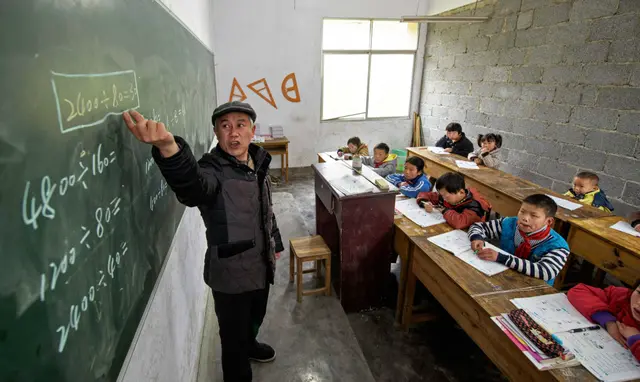Chinese schools have been recruiting younger and better-educated teachers over the past five years, according to a report released by the Ministry of Education on Monday.
Young and middle-aged teachers make up the majority of teachers in elementary and middle schools, where 56 percent are under 40 and 71 percent are below 45. The percentages are much higher than that in 2010.
From 2010 to 2014, an average of 34,000 normal university and college graduates taught in rural schools annually, a 75 percent increase from the number in 2009, according to the report.
During the same period, the Chinese government invested 6.4 billion yuan (1.01 billion U.S. dollars) in training teachers in elementary and middle schools as well as kindergartens nationwide.
Though progress has been made, the ministry vowed more work to improve teaching quality.
Combating school bribery
One particular problem is the tendency for teachers to take backhanders and profit from after-school lessons.
To combat this, the ministry said on Monday that it will expand nationwide a registration system for elementary and middle school teachers next year, dismissing the ones who fail.
The system has been tested in 22 provinces since 2011 and has seen 2,000 teachers fired.
"Teachers' ethics have been a key part in their professional evaluation. Anyone with ethics violations will be dismissed," said Xu Tao, director of the teachers work bureau under the ministry, at a press conference.
Gifting is reportedly more frequent in prestigious schools and mostly concerns Chinese, English and math, the three primary subjects for the exams, which are considered make-or-break in China.
"Many parents strongly urge us to hold extra lessons for their children after school, but I also want to make some money myself," one Beijing teacher told Xinhua on condition of anonymity.
In some rural areas where official supervision is slack, parents have to routinely pay elementary school teachers just to have their children seated to the front of a classroom so they can see and hear more clearly.
According to a report by the ministry, China's 31 provincial-level regions have all come up with rules on teachers' conduct and more than 95 percent of schools responded to a survey that they weigh morality heavily in their staff evaluation.
Teachers are banned from demanding gifts and money from parents, receiving money for extra lessons, forcing students to buy additional learning materials or introducing them to other education institutions.
Despite of efforts, in September, the Shanghai Academy of Social Sciences released results of a survey of 3,000 parents and 15,000 students showing that 7.4 percent of the former and 10 percent of the latter held negative views on the morality of teachers in elementary and middle schools.
Ten percent of the parents admitted they had sent gifts to teachers.
Jin Zhongming, a professor at East China Normal University, said regulating teachers must be done at the same time as protecting their interests.
While praising the system of evaluating teachers, Jin said measures should be taken to make teachers feel more happy and respected so that they are more likely to follow the rules and teach better.
Training rural teachers
The government also plans to provide 360 hours of training to 3.3 million rural teachers over the next five years.
"We will provide distance learning or send professionals to rural areas, while also establishing development centers," Xu said on Monday.
China has more than 15 million teachers. There is a disparity in teaching quality between urban and rural areas because of imbalanced economic and social development.
Xu said the ministry would encourage local governments to employ and train more locally-born teachers, provide living allowances for all rural teachers in impoverished areas, and encourage local governments to offer life insurance and medical insurance to boost recruitment.
 简体中文
简体中文

